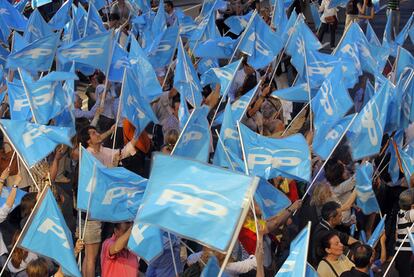PP inflicts massive electoral defeat on Socialists
Popular Party records best-ever results in local and regional polls; pro-independence Bildu enjoys success in Basque Country; turnout up on 2007 ballot; May 15 protestors decide to continue Sol sit-in

The Socialist Party of Prime Minister José Luis Rodríguez Zapatero suffered a massive defeat at the hands of the conservative opposition in Sunday's nationwide local and regional elections. After a campaign fought against the backdrop of unemployment at almost five million, an ongoing economic crisis and a growing protest movement that brought tens of thousands of people onto the streets to demand "real democracy now," the Socialists were ousted from power in almost all of Spain's regions, besides losing control of key city halls such as Barcelona and Seville.
PP leader Mariano Rajoy can now feel extremely confident about general elections, slated for March 2012, after his party received an historic 37.5 percent of the vote nationwide, a full 10 percentage points ahead of the governing party. "The citizens have expressed their discontentment with the crisis," admitted Zapatero. "It is reasonable that the Socialists should receive this punishment."
The prime minister also ruled out the calling of early elections.
For his part, Rajoy seemed determined to avoid being perceived as triumphalist, and instead promised that his party would work for "those who are suffering the effects of the crisis."
Although voters were choosing 70,000 local and regional leaders, this vote was widely viewed as a preview of next year's general elections. Turnout, under close scrutiny after the streets protests and sit-ins largely held in criticism at perceived undemocratic and often corrupt behavior of the two dominant parties, was over 66 percent, up three percentage points on 2007. The number of blank and spoiled ballots also rose to over four percent, however.
In the Basque Country, where only municipal and provincial votes were held, the radical pro-independence coalition Bildu was the top-voted force in Guipúzcoa province and in the city of San Sebastián. Bildu ran for office after a protracted legal battle that went all the way up to the Constitutional Court, which finally ruled that it did not represent a continuation of Batasuna, ETA's outlawed political wing.
In Seville, the PP toppled the long-ruling Andalusian Socialists in a result which is probably a sign of things to come in a region that has been governed by the left since the advent of democracy. The Socialists also lost the city of Barcelona to the Catalan nationalists of CiU, which could conceivably enter into a coalition with the PP to obtain the majority it needs to gain the mayoralty. Voters also strongly favored the PP in the city of Madrid.
In none of the 13 regional polls did the Socialist Party receive the most votes, losing fiefdoms such as Castilla-La Mancha and Asturias. The only ray of light for the left came in Extremadura, where the United Left's (IU) three seats will enable the Socialists to remain in power despite the PP's overall victory. IU saw its vote rise nationwide just under a percentage point to 6.3 percent after it had courted the support of the youth protestors in Spanish cities last week. But the left-wing coalition lost the jewel in its crown as Córdoba City Hall fell to the PP.
Meanwhile, the 15-M movement did not break up on Sunday night as planned. Instead, the spontaneous sit-in will continue for another week at Madrid's Puerta del Sol, a citizen assembly decided. Next Sunday, a new popular vote will determine whether the public protest against Spain's political class goes any further, or whether two weeks of round-the-clock demonstrations are enough to get their message across.
A new committee will also ensure that the protest does not peter out or disband in case the police should intervene. The security forces have so far allowed the demonstrators to remain in Sol despite an official ban on the protests ahead of Sunday's local and regional elections. Thousands of people continue to demand "real democracy" in several Spanish cities.
For Zapatero this was a bitter last electoral night in charge of the Socialists. Upcoming primaries will decide who takes his place as the party's candidate for 2012, with the two anticipated contenders being Deputy Prime Minister Alfredo Pérez Rubalcaba and Defense Minister Carme Chacón.
Tu suscripción se está usando en otro dispositivo
¿Quieres añadir otro usuario a tu suscripción?
Si continúas leyendo en este dispositivo, no se podrá leer en el otro.
FlechaTu suscripción se está usando en otro dispositivo y solo puedes acceder a EL PAÍS desde un dispositivo a la vez.
Si quieres compartir tu cuenta, cambia tu suscripción a la modalidad Premium, así podrás añadir otro usuario. Cada uno accederá con su propia cuenta de email, lo que os permitirá personalizar vuestra experiencia en EL PAÍS.
¿Tienes una suscripción de empresa? Accede aquí para contratar más cuentas.
En el caso de no saber quién está usando tu cuenta, te recomendamos cambiar tu contraseña aquí.
Si decides continuar compartiendo tu cuenta, este mensaje se mostrará en tu dispositivo y en el de la otra persona que está usando tu cuenta de forma indefinida, afectando a tu experiencia de lectura. Puedes consultar aquí los términos y condiciones de la suscripción digital.








































